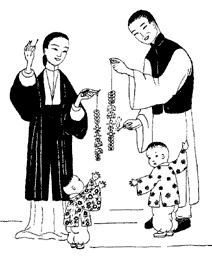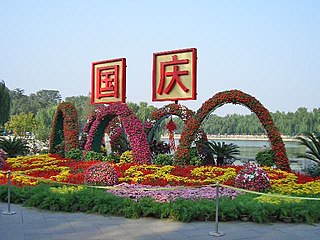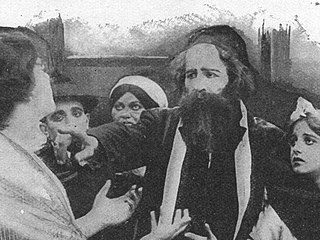This article needs additional citations for verification .(February 2018) |
This is a list of major annual events in China.
This article needs additional citations for verification .(February 2018) |
This is a list of major annual events in China.

The traditional Chinese calendar is a lunisolar calendar which identifies years, months, and days according to astronomical phenomena. In China, it is defined by the Chinese national standard GB/T 33661-2017, "Calculation and Promulgation of the Chinese Calendar", issued by the Standardization Administration of China on May 12, 2017.

Labour Day is an annual holiday to celebrate the achievements of workers. Labour Day has its origins in the labour union movement, specifically the eight-hour day movement, which advocated eight hours for work, eight hours for recreation, and eight hours for rest.

Mother's Day is a celebration honoring the mother of the family or individual, as well as motherhood, maternal bonds, and the influence of mothers in society. It is celebrated on different days in many parts of the world, most commonly in the months of March or May. It complements similar celebrations, honoring family members, such as Father's Day, Siblings Day, and Grandparents' Day.

The National Day of the Republic of China or the Taiwan National Day, also referred to as Double Ten Day or Double Tenth Day, is a public holiday on 10 October, now held annually as national day in Taiwan. It commemorates the start of the Wuchang Uprising on 10 October 1911 which ultimately led to the collapse of the imperial Qing dynasty and establishment of the Republic of China on 1 January 1912. The day was once held as public holiday in mainland China during the Mainland Period of the ROC before 1949. The subsequent People's Republic of China continues to observe the Anniversary of the Xinhai Revolution at the same date but not as a public holiday, which put more emphasis on its revolutionary characteristics as commemoration of a historical event rather than celebration to the founding of the Republic of China.

Japanese calendar types have included a range of official and unofficial systems. At present, Japan uses the Gregorian calendar together with year designations stating the year of the reign of the current Emperor. The written form starts with the year, then the month and finally the day, coinciding with the ISO 8601 standard. For example, February 16, 2003, can be written as either 2003年2月16日 or 平成15年2月16日. 年 reads nen and means "year", 月 reads gatsu (がつ) and means "month" and finally 日 (usually) reads nichi and means "day".

International Women's Day (IWD) is a global holiday celebrated annually on March 8 as a focal point in the women's rights movement, bringing attention to issues such as gender equality, reproductive rights, and violence and abuse against women. Spurred on by the universal female suffrage movement, IWD originated from labor movements in North America and Europe during the early 20th century.

The Dragon Boat Festival is a traditional Chinese holiday which occurs on the fifth day of the fifth month of the Chinese calendar, which corresponds to late May or June in the Gregorian calendar.
The traditional Korean calendar or Dangun calendar is a lunisolar calendar. Dates are calculated from Korea's meridian, and observances and festivals are based in Korean culture.

The Qingming festival or Ching Ming Festival, also known as Tomb-Sweeping Day in English, is a traditional Chinese festival observed by ethnic Chinese in mainland China, Hong Kong, Macau, Taiwan, Malaysia, Singapore, Cambodia, Indonesia, Philippines, Thailand, Vietnam and Panama. A celebration of spring, it falls on the first day of the fifth solar term of the traditional Chinese lunisolar calendar. This makes it the 15th day after the Spring Equinox, either 4, 5 or 6 April in a given year. During Qingming, Chinese families visit the tombs of their ancestors to clean the gravesites and make ritual offerings to their ancestors. Offerings would typically include traditional food dishes and the burning of joss sticks and joss paper. The holiday recognizes the traditional reverence of one's ancestors in Chinese culture.
Public holidays and statutory holidays in Hong Kong are holidays designated by the Government of Hong Kong. They allow workers rest from work, usually in conjunction with special occasions.

Cambodia has numerous public holidays, including memorial holidays and religious holidays of Buddhist origin. The Khmer traditional calendar, known as ចន្ទគតិ Chântôkôtĕ, is a lunisolar calendar although the word itself means lunar calendar. While the calendar is based on the movement of the moon, calendar dates are also synchronized with the solar year to keep the seasons from drifting.

Public holidays in Malaysia are regulated at both federal and state levels, mainly based on a list of federal holidays observed nationwide plus a few additional holidays observed by each individual state and federal territory. The public holidays are a mix of secular holidays celebrating the nation and its history, and selected traditional holidays of the various ethnic and religious groups that make up the country.

There are currently seven official public holidays in mainland China. Each year's holidays are announced about three weeks before the start of the year by the General Office of the State Council. A notable feature of mainland Chinese holidays is that weekends are usually swapped with the weekdays next to the actual holiday to create a longer holiday period.

The following are considered holidays in Taiwan. Some are official holidays, and some are not:

Buddha's Birthday is a Buddhist festival that is celebrated in most of East Asia and South Asia commemorating the birth of the Prince Siddhartha Gautama, later the Gautama Buddha, who was the founder of Buddhism. According to Buddhist tradition, Gautama Buddha was born c. 563–483 BCE in Lumbini, Nepal. Archaeologists from Durham University working in Nepal have uncovered evidence of a structure at the birthplace of the Buddha dating to the sixth century B.C. using a combination of radiocarbon and optically stimulated luminescence techniques
Annual leave is a period of paid time off work granted by employers to employees to be used for whatever the employee wishes. Depending on the employer's policies, differing number of days may be offered, and the employee may be required to give a certain amount of advance notice, may have to coordinate with the employer to be sure that staffing is the employee's absence, and other requirements may have to be met. The vast majority of countries today mandate a minimum amount of paid annual leave by law.

National Day, officially the National Day of the People's Republic of China (中华人民共和国国庆节), is a public holiday in China celebrated annually on 1 October as the national day of the People's Republic of China, commemorating the formal proclamation of the establishment of the People's Republic of China on 1 October 1949. The Chinese Communist Party victory in the Chinese Civil War resulted in the Kuomintang retreat to Taiwan and the Chinese Communist Revolution whereby the People's Republic of China "replaced" the Republic of China.

Chinese New Year is the festival that celebrates the beginning of a new year on the traditional lunisolar Chinese calendar. In Chinese, the festival is commonly referred to as the Spring Festival as the spring season in the lunisolar calendar traditionally starts with lichun, the first of the twenty-four solar terms which the festival celebrates around the time of the Chinese New Year. Marking the end of winter and the beginning of the spring season, observances traditionally take place from New Year's Eve, the evening preceding the first day of the year to the Lantern Festival, held on the 15th day of the year. The first day of Chinese New Year begins on the new moon that appears between 21 January and 20 February.

Throughout the history of Christianity, Jewish peoples have been historically religious minorities in countries that were majority or even officially Christian. Over time, a unique relationship evolved between the Jews and the major Christian holiday of Christmas, including the creation of separate traditions and the intersection of Hanukkah and Christmas, among other convergences. Some practices perpetuate out of a feeling of otherness, while others are merely lighthearted activities that are accessible when shops are closed around Christmastime.